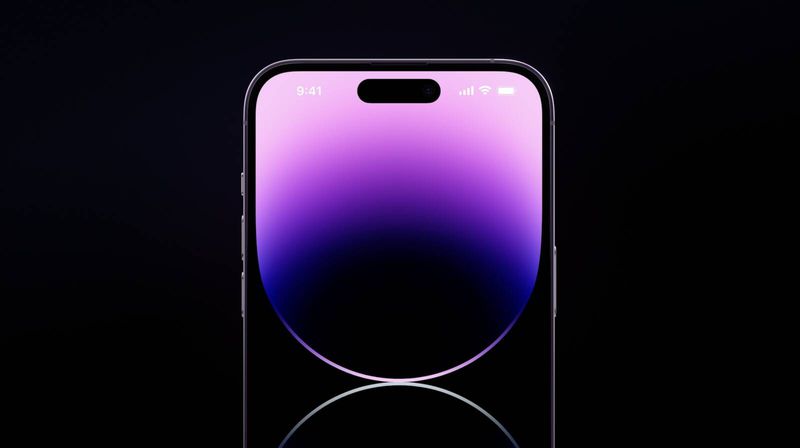
iPhone 14 Pro Discontinued
Apple discontinued the iPhone 14 Pro in September 2023 following the introduction of the iPhone 15 lineup. With the launch of the new iPhones, Apple removed the previous-generation Pro models from sale, while the standard iPhone 14 and iPhone 13 models slid down the pricing tiers as cheaper options. While Apple is no longer offering the iPhone 14 Pro for sale, it may still be available from third-party vendors. The roundup below is no longer being updated.
Should You Buy an iPhone 14 Pro?
Released in September 2022, the iPhone 14 Pro and iPhone 14 Pro Max are Apple's current flagship iPhones, sold alongside the iPhone 14 and iPhone 14 Plus. Now is not the best time to buy an iPhone 14 Pro or Pro Max because the iPhone 15 Pro and Pro Max are coming in September 2023. If having the newest technology is important to you, you should wait to buy an iPhone.

The iPhone 15 Pro models will feature upgraded camera technology, USB-C charging, and a faster A-series chip, all of which is worth holding out for. If you're not interested in the latest technology, now is an okay time to buy, but you may want to instead opt for the iPhone 14 to save some money. It doesn't have the Dynamic Island and the camera isn't quite as good, but it is several hundred dollars cheaper.
Choosing an iPhone is a major decision, so we have some buyer's guides that walk you through choosing the best device for you, and you'll also want to check out our iPhone deals post to get the best prices.
iPhone 14 Pro and iPhone 14 Pro Max Features Explained
Contents
- iPhone 14 Pro Discontinued
- Should You Buy an iPhone 14 Pro?
- iPhone 14 Pro and iPhone 14 Pro Max Features Explained
- Pricing and Availability
- Reviews
- Design
- Display
- A16 Chip
- TrueDepth Camera and Face ID
- Triple-Lens Rear Camera
- Battery Life
- 5G Connectivity
- Emergency SOS via Satellite
- Crash Detection
- Bluetooth, WiFi, NFC, GPS, and U1
- MagSafe
- iPhone 14 and iPhone 14 Plus
- Future iPhones
- iPhone 14 Pro Roundup Changelog
- iPhone 14 Pro Timeline
Announced on September 7, the iPhone 14 Pro and iPhone 14 Pro Max are Apple's new high-end flagship smartphones, being sold alongside the lower-cost iPhone 14 and iPhone 14 Plus. The iPhone 14 Pro models are much more feature rich than the iPhone 14 models, offering camera technology improvements, better display capabilities, a faster A16 chip, and more.
The 6.1 and 6.7-inch iPhone 14 Pro models look like the iPhone 13 Pro models with flat edges, stainless steel enclosure, a textured matte glass back, IP68 water resistance, and a Ceramic Shield-protected display, but the camera bumps are larger to accommodate new lenses, and the display has also changed.
There is no longer a notch for the TrueDepth camera system, with Apple instead adopting what it calls the Dynamic Island, a pill-shaped cutout at the front of the display that houses camera equipment and can change in shape and size using software depending on what's on the screen.
Apple says the Dynamic Island is meant to blend the line between hardware and software. It is able to adapt in real time, showing alerts, notifications, and activities in the space where the notch used to be. There is still hardware under there, but the TrueDepth camera takes up less space and the Dynamic Island makes it blend into the background by taking better advantage of the screen. The Dynamic Island can show payment confirmations with Face ID, Maps directions, phone calls, music information, Live Activities like sports scores, timers, and more, plus it can be interacted with using a tap and hold gesture.
The iPhone 14 Pro and Pro Max feature a new Super Retina XDR display with updated ProMotion technology that allows for an Always-On display, a first for an iPhone. The Always-On display is made possible through a new 1Hz to 120Hz refresh rate along with improved power efficient technologies. When the Always-On display is active, the time, widgets, and Live Activities remain available at a glance at all times, and the wallpaper is dimmed.
In addition to Always-On technology, the iPhone 14 Pro's Super Retina XDR display offers higher peak HDR brightness at up to 2000 nits, which puts it on par with the Pro Display XDR. It offers the highest outdoor peak brightness in a smartphone, and it is twice as bright as the iPhone 13 Pro when in sunny conditions.
There's an updated A16 chip in the iPhone 14 Pro models, and this marks the first time that Apple has used different chips for the iPhone 14 and the iPhone 14 Pro. The A16 is the first chip built on the new 4-nanometer process, bringing speed and efficiency improvements. The A16 has a faster 6-core CPU, an accelerated 5-core GPU with 50 percent more memory bandwidth, and an updated 16-core Neural Engine performs 17 trillion operations per second.
Apple added a 48-megapixel Wide camera with a quad-pixel sensor that adapts to the photo being captured, so the detail of a 48-megapixel photo is compressed into a 12-megapixel photo. For most photos, every four pixels are combined into one large quad pixel for even better low-light performance. The 48-megapixel lens also enables a 2x Telephoto mode that uses the middle 12 megapixels for full-resolution photos with no digital zoom. This joins the existing 3x zoom enabled by the dedicated Telephoto lens, which has also been improved.
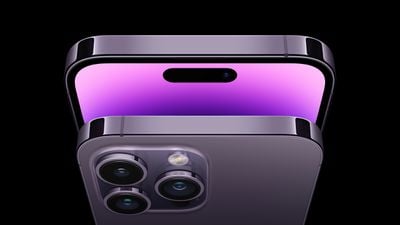
The iPhone 14 Pro models are able to shoot at the full 48MP with ProRAW, enabling the new iPhones to take impressive professional photos. Second-generation sensor-shift optical image stabilization reduces shake and blur, and a new 12 megapixel Ultra Wide camera has larger pixels for sharper images with more details and a better macro mode.
The TrueDepth front-facing camera has an improved f/1.9 aperture for better low-light selfies and videos, and it supports autofocus for the first time. The Adaptive True Tone flash has been redesigned with an array of nine LEDs that change pattern based on the lens focal length. Features like Night mode, Smart HDR 4, Portrait Mode, and Photographic Styles continue to be available.
Apple's A16 chip powers a Photonic Engine that improves low-light performance across all of the lenses in the iPhone 14 Pro models. The Telephoto, Wide, and front-facing TrueDepth cameras offer 2x better low-light performance with the Photonic Engine, while the Ultra Wide lens supports 3x better low-light performance. The Photonic Engine expands on Deep Fusion and provides impressive detail while preserving subtle textures and providing improved color.
For video, there's an Action Mode that provides smooth-looking video with better image stabilization than ever before. Action Mode is able to adjust to significant shakes, motion, and vibrations, even when video is captured in the middle of action. Cinematic Mode has been improved and is available in 4K at 30 fps and 4K at 24 fps.
The iPhone 14 Pro models include a dual-core accelerometer that can measure up to 256Gs, and the accelerometer and a high dynamic range gyroscope power a Crash Detection feature that can contact emergency services if you're in a serious accident and can't reach your iPhone. Apple also uses other sensors to power this feature, so the barometer detects changes in cabin pressure, the GPS watches for speed changes, and the microphone can listen for car crash noises.
Apple also added Emergency SOS via satellite, an option that allows the iPhone 14 to connect directly to satellites for communication purposes in emergency situations when WiFi and cellular are not available. Emergency SOS via satellite works in open areas with few trees, and it allows users to send texts to emergency personnel. It is free for two years, and works in the U.S. and Canada. Satellite connectivity can also be used to share your location with friends and family in Find My when you're out hiking or camping in remote areas.
The iPhone 14 Pro models support 5G connectivity (sub-6GHz and mmWave in the United States), and they use a new Qualcomm X65 modem. In the United States, iPhone models ship without a physical SIM card as carriers now use eSIM.
Battery life has been improved with the iPhone 14 Pro and Pro Max, and it lasts an hour longer than the iPhone 13 Pro models. The iPhone 14 Pro lasts for up to 23 hours when watching videos, and the Pro Max lasts for up to 29 hours when watching videos.
The iPhone 14 Pro models are available in 128GB, 256GB, 512GB, and 1TB storage capacities. MagSafe charging up to 15W continues to be supported, and fast charging over Lightning is available with a 20W or higher charger. The iPhone 14 Pro and 14 Pro Max also support WiFi 6 and Bluetooth 5.3.
The iPhone 14 Pro models come in deep purple, silver, gold, and space black, and pricing starts at $999. Pre-orders began on Friday, September 9, with a launch to follow on Friday, September 16.
Note: See an error in this roundup or want to offer feedback? Send us an email here.
Pricing and Availability
iPhone 14 Pro pricing starts at $999 for 128GB of storage, while pricing on the iPhone 14 Pro Max starts at $1,099 for 128GB of storage. Additional storage is available for a higher price. The iPhone 14 Pro models can be purchased from the online Apple Store, Apple retail locations, and third-party retailers.
Reviews
Reviews of the iPhone 14 Pro and iPhone 14 Pro Max were positive, highlighting the major new feature such as an always-on display with a new Dynamic Island, upgraded cameras with a 48-megapixel main lens, car crash detection and satellite connectivity for emergencies, the A16 Bionic chip for faster performance, and new Deep Purple and Space Black color options. Emergency SOS via Satellite is not launching until November, so the feature was not available for review at the time.
Dynamic Island
Exclusive to the iPhone 14 Pro models, the Dynamic Island replaces the traditional notch found on all iPhone 13 models. Aided by software, the cutout morphs into different shapes and sizes for things such as incoming phone calls, alerts, notifications, Face ID authentication, timers, turn-by-turn navigation, Live Activities, and more.
While the Dynamic Island is certainly more useful than the notch on previous iPhones, The Verge's Nilay Patel said the feature's potential is not fully realized yet, as it currently only supports third-party apps that use the Now Playing or CallKit APIs.
"Right now, the Dynamic Island feels like one of those things that need a year of refinement and developer attention before we really know how important it is," said Patel.
Always-On Display
TheStreet's Jacob Krol said the iPhone 14 Pro's new always-on display did not have a noticeable impact on battery life during his testing:
And from my testing so far, using the always-on display doesn't negatively impact the battery life or overall runtime of the 14 Pro or 14 Pro Max. I've still been able to get a full day of moderate use on the 14 Pro, with the larger in size -- and likely in battery capacity -- 14 Pro Max lasting for a day and half with the same use. Apple specifically called out some enhancements within the new A16 Bionic which has cores designed to be efficient operators of the display.
48-Megapixel Camera
Input's Raymond Wong put the iPhone's new 48-megapixel main lens to the test and was impressed with the 48-megapixel ProRAW photos, but he said he could barely notice a difference for pixel-binned 12-megapixel photos in daylight.
I've tested more than my share of Android phones with high-megapixel camera sensors and they've always underwhelmed in some way. Apple’s ProRAW DNG was a bit disappointing for the iPhone 13 Pro and 12 Pro; there's barely more detail to get from a 12-megapixel RAW compared to a 12-megapixel JPEG. Not so with 48-megapixel ProRAW files; these images are massive (often clocking in between 70-80MB) and the amount of detail you can get is borderline nuts for a phone.
Wong's review includes numerous photos shot on the iPhone 14 Pro and iPhone 14 Pro Max.
Deep Purple and Space Black Colors
Wong also shared his thoughts on the new Deep Purple and Space Black color options:
My iPhone 14 Pro review unit is Space Black. I love it. The glass back and the stainless steel frame are noticeably darker than the gray Graphite iPhone 13 Pro; like a mix between the black and Jet Black iPhone 7. My iPhone 14 Pro Max review unit is Deep Purple; it's a dark purple that sometimes looks gray or black. Both look sleek in person; both are still fingerprint magnets. You can also get them in silver and gold.
A16 Bionic Chip
Wong shared Geekbench 5 results for the iPhone 14 Pro models, revealing up to a 16% increase in multi-core performance compared to the 13 Pro:
- iPhone 12 Pro: (A14 Bionic): 1,586 single-core / 3,937 multi-core
- iPhone 13 Pro: (A15 Bionic): 1,725 / 4,722
- iPhone 14 Pro: (A16 Bionic): 1,875 / 5,495
Battery Life
The Wall Street Journal's Joanna Stern said iPhone 14 Pro models did not get significantly longer battery life than iPhone 13 Pro models:
As far as battery life goes, none of the iPhone 14 or 14 Pro models I tried lasted significantly longer than their predecessors. The story might be different with the step-up model, the iPhone 14 Plus. Apple says it has "our longest battery life ever"—I'll test that claim when it arrives.
Design
Like the iPhone 13 Pro models, the iPhone 14 Pro models use the same flat-sided design with squared off edges that harkens back to the iPhone 4.
When it comes to the chassis, the iPhone 14 Pro and Pro Max are almost identical to the iPhone 13 Pro models with an all-glass front and a textured matte glass back that sandwich a frame made from surgical-grade stainless steel. The color of the stainless steel frame matches the color of the glass at the back for a streamlined look.
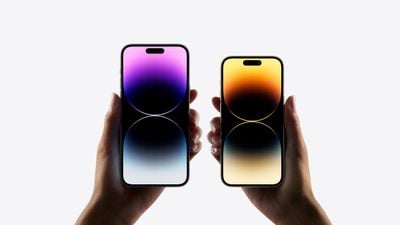
Apple did away with the notch for the iPhone 14 Pro models, instead introducing what it's calling the "Dynamic Island," which we'll explain in more detail below. Design wise, the Dynamic Island consists of a pill-shaped cutout and a circular cutout, both of which house the TrueDepth camera system. Apple blends the pill-shaped cutout and circular cutout into one larger pill, which is 30 percent smaller than the notch.
There are antenna bands at the top and sides of the phone, along with a Lightning port for charging. In the United States, there is no longer a SIM slot at the left side of the device, but in some other countries, the physical SIM hardware remains. A durable Ceramic Shield display protects the front of the device. Apple says that the Ceramic Shield is made by infusing nano-ceramic crystals into glass, optimizing for clarity and toughness. The Ceramic Shield is meant to provide better protection against scratches and everyday wear and tear.

A square camera bump is located at the back of the iPhone 14 Pro models, and the bump is larger than it was last year to accommodate new camera technology. There is a triple-lens camera setup, and each individual lens is also larger in size.
Sizes
The iPhone 14 Pro is a 6.1-inch smartphone, while the iPhone 14 Pro Max measures in at 6.7 inches. Along with the iPhone 14 Plus, it is Apple's largest iPhone. Compared to the iPhone 13 Pro models, the iPhone 14 Pro and Pro Max are a bit differently sized. The iPhone 13 Pro is a bit taller, while the iPhone 14 Pro Max is a bit thinner. Both models are a little thicker and a touch heavier.
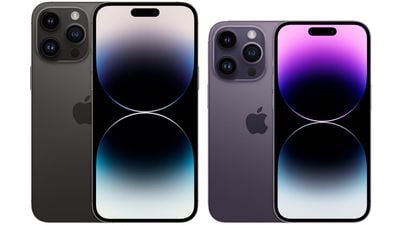
The iPhone 14 Pro measures in at 5.81 inches tall (147.5mm), 2.81 inches wide (71.5mm), and 0.31 inches thick (7.85mm). The iPhone 14 Pro Max measures in at 6.33 inches tall (160.7mm), 3.05 inches wide (77.6mm), and 0.31 inches thick (7.85mm).
Apple's iPhone 14 Pro weighs 7.27 ounces or 206 grams, while the Pro Max weighs 8.47 ounces or 240 grams.
Colors
The iPhone 14 Pro and Pro Max come in Silver, Gold, Space Black, and Deep Purple. Both Space Black and Deep Purple are new colors this year, with Deep Purple replacing the Sierra Blue color that was available with the iPhone 13 Pro models.
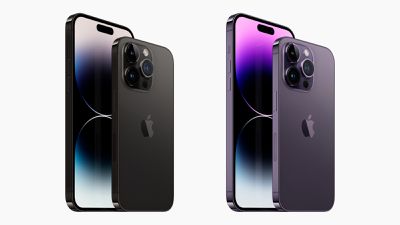
Water Resistance
The iPhone 14 Pro and Pro Max have an IP68 water resistant rating. They are able to withstand liquid that's up to six meters deep (19.7 feet) for up to 30 minutes, identical to the iPhone 13 Pro models.
Breaking down IP68, the 6 refers to dust resistance (and means the iPhone 13 Pro can hold up to dirt, dust, and other particulates), while the 8 pertains to water resistance. IP6x is the highest dust resistance rating that exists. With the IP68 water resistance rating, the iPhone 14 Pro can hold up to splashes, rain, and accidental water exposure, but intentional water exposure should be avoided if possible.
Water and dust resistance are not permanent conditions, according to Apple, and can deteriorate over time as a result of normal wear. Apple's warranty does not cover liquid damage, which means it's best to use caution when it comes to exposing the iPhone 14 Pro models to liquid.
Display
The iPhone 14 Pro and Pro Max are equipped with an upgraded OLED Super Retina XDR display, which is flexible and extends into the body of each device. A 2,000,000:1 contrast ratio allows for blacker blacks and brighter whites, and there's up to 2000 nits peak brightness when outdoors to make it easier to see the display in the sun.
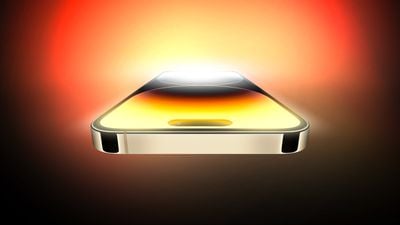
Typical max brightness is 1000 nits, but 1600 nits peak brightness is supported for HDR, and the display is much brighter than the iPhone 13 Pro display.
The 6.1-inch iPhone 14 Pro features a resolution of 2556 x 1179 with 460 pixels per inch, while the 6.7-inch iPhone 14 Pro Max has a resolution of 2796 x 1290 with 460 pixels per inch.
Wide color support provides vivid, true-to-life colors, and True Tone matches the white balance of the display to the ambient lighting of the room the device is in for a paper-like viewing experience that's meant to be easier on the eyes. There's also a fingerprint-resistant oleophobic coating and support for Haptic Touch, which provides haptic feedback when interacting with the display.
Dynamic Island
There is no notch on the iPhone 14 Pro and Pro Max models, with Apple doing away with a design it has used since the 2017 iPhone X. Apple has redesigned the TrueDepth camera hardware, placing the proximity sensor under the display and using smaller cutouts for the camera, the dot projector, and other components.
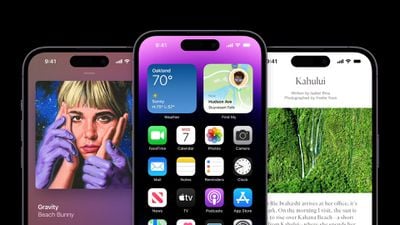
The display has a small circular cutout on the right side that's for the camera, and a pill-shaped cutout on the left side for the TrueDepth system for Face ID. Apple is using software to combine these two cutouts into one pill-shaped cutout that is calling the "Dynamic Island."
The Dynamic Island is not just a cutout, with Apple turning it into part of the interface. It morphs and changes shape to accommodate what's on the iPhone's screen, and it's used as a sort of front-and-center information hub.
Apple blends the Dynamic Island into the display by using it to provide at-a-glance information about apps and services you're using on your iPhone. When making an Apple Pay payment, for example, Dynamic Island expands into a square shape to match the Face ID confirmation interface, and when on a phone call, it expands to be larger so you can have phone controls right at your fingertips.
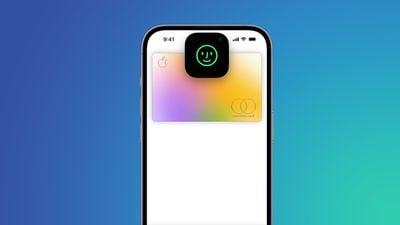
It can display everything from Maps directions to timers to Apple Music and the AirPods connection status. It integrates with Live Activities in iOS 16 for tracking sports scores, Uber rides, and more right from the top of the iPhone's display without leaving the app you're in.
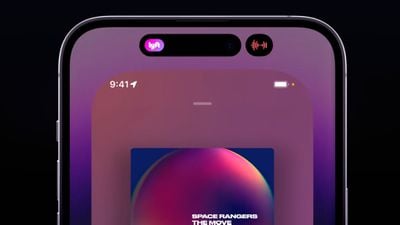
It can collapse down if you want to see what's on your display, or, if you tap it, it can open up so content can be interacted with. There's a function that allows it to split out into two separate cutouts that show different information, and third-party apps can add Dynamic Island support too.
ProMotion
The iPhone 14 Pro and Pro Max have updated low-power display backlighting that supports ProMotion refresh rates, much like the iPhone 13 Pro models. This year's iPhones offer adaptive refresh rates that range from 1Hz to 120Hz, down from 10Hz to 120Hz in last year's models.
The refresh rate of the display changes based on what's on the screen. So if you're reading a website that's static, the iPhone will use a lower refresh rate, but if you're playing a game, watching a movie, or scrolling through content, you'll see higher 120Hz refresh rates that provide a smoother and more responsive experience.
Always-On Technology
The new 1Hz refresh rate option enables an Always-On display feature that's a first for an iPhone. The Apple Watch has had always-on display technology for a few years now, but this is the first time that Apple has been able to make it work on an iPhone without draining too much battery.
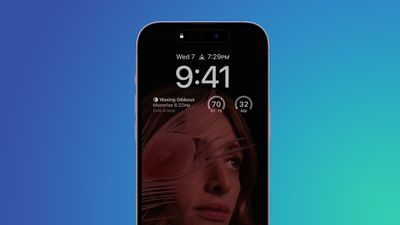
With the Always-On display, the time and widgets stay active on the Lock Screen, while the wallpaper is darkened to give it a subtle look. The status bar, flashlight, and camera buttons are hidden when the display is not active.
When the iPhone is in a pocket or face down, the screen does turn off completely to preserve battery life.
A16 Chip
Apple designed an A16 Bionic chip for the iPhone 14 Pro and Pro Max, and it is the first chip built on a new 4-nanometer process. It includes two high-performance cores and four high-efficiency cores, and so far has demonstrated modest improvements over the A15 chip in the iPhone 13 Pro.
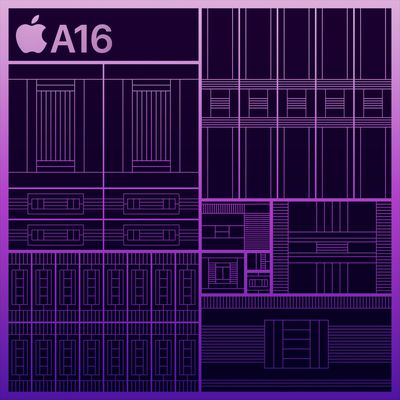
The A16 earned a single-core score of 1887 and a multi-core score of 5455, while the A15 earned a 1707 in single-core performance and 4659 in multi-core performance. That's an improvement of 10.5 and 17.1 percent, respectively.
The A16 Bionic includes an accelerated 5-core GPU with 50 percent more memory bandwidth.
Neural Engine and ISP
There's an updated 16-core Neural Engine in the A16, and it is capable of nearly 17 trillion operations per second.
The A16 chip also includes an image signal processor that powers the photographic features of the iPhone 14 Pro and Pro Max, with up to four trillion operations performed per photo.
RAM
There is 6GB RAM in the iPhone 14 Pro and Pro Max, which is the same amount of RAM in the iPhone 13 Pro models. The iPhone 14 Pro and Pro Max include faster LPDDR5 memory, which improves performance compared to the prior-generation iPhone 13 Pro models, which featured LPDDR4X memory.
Storage Space
Storage space starts at 128GB for the most affordable versions of the iPhone 14 Pro and Pro Max, but 256GB, 512GB, and 1TB options are also available.
TrueDepth Camera and Face ID
The iPhone 14 Pro models support Face ID, the facial recognition system that was first introduced in 2017. Face ID components are housed in the TrueDepth camera system, which is located in the pill-shaped cutout on the front of the display.
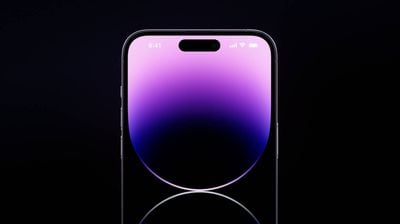
Face ID is used for unlocking the iPhone, authenticating payments, as a password replacement, and more. Face ID works through a set of sensors and cameras. A Dot Projector projects tens of thousands of invisible infrared dots on the surface of the skin to create a 3D facial scan that maps the curves and planes of each face.
The depth map is relayed to the A16 chip, where it is transformed into a mathematical model that the iPhone uses to authenticate identity. Face ID works in low light and in the dark, and with hats, beards, glasses, sunglasses, scarves, and as of iOS 15, face masks.
Front Facing Camera Features
There's a new f/1.9 aperture front-facing TrueDepth camera that's able to offer better low-light performance for selfie photos and videos. The front-facing camera also supports autofocus for the first time, so it can focus faster in low light and capture group selfies from further away.
Triple-Lens Rear Camera
Wide Lens
There's an upgraded 48-megapixel Wide lens on the iPhone 14 Pro and Pro Max, which uses second-generation sensor-shift optical image stabilization and which features a quad-pixel sensor. The lens features a 24mm focal length and an f/1.78 aperture.
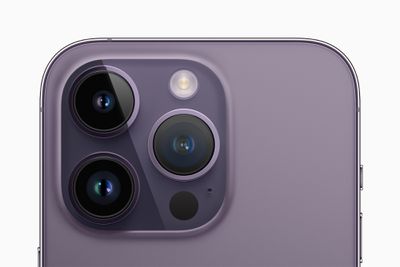
To keep file sizes reasonable, the quad-pixel sensor combines every four pixels into a single pixel that's equivalent to 2.44 µm, essentially turning the 48MP photo into a 12MP photo with impressive detail and low-light performance because the combined pixels allow for 4x more light.
The quad-pixel sensor enables a new 2x Telephoto option that uses the middle 12 megapixels on the sensor for full resolution photos with no digital zoom.
When in ProRAW mode, the iPhone is able to capture ProRAW images at the full 48-megapixel size for more detail, which Apple says enables new creative workflows for pro users. Third-party camera apps can also take advantage of the 48MP lens, capturing full-resolution images.
Ultra Wide Lens
There is a new 12-megapixel Ultra Wide lens with larger 1.4 µm pixels to provide sharper images with more detail, and to offer more detail for macro photos.
The six-element lens features a 13mm focal length, f/2.2 aperture, and 120 degree field of view.
Telephoto Lens
The improved Telephoto camera offers 3x optical zoom, which can be used alongside the 2x zoom enabled by the Wide camera. The six-element lens has a 77mm focal length with an f/2.8 aperture and optical image stabilization support.
Photonic Engine
The Photonic Engine is a new software feature that builds on Deep Fusion, applying it earlier in the imaging process to provide more detail, preserve subtle textures, and improve the color in the photo.
Apple says that the Photonic Engine offers a "giant leap" for mid to low-light photo performance in photos across all cameras. Low-light performance is up to 2x better on the Wide camera, up to 3x better on the Ultra Wide camera, 2x better on the Telephoto camera, and 2x better on the front-facing TrueDepth camera.
Video Capabilities
The iPhone 14 Pro and Pro Max offer up to 4K video recording at 24, 25, 30, or 60 fps. HDR recording, ProRes video, slo-mo video, and time-lapse are all supported. Note that recording ProRes video in 4K requires at least a 256GB iPhone 14 Pro model.
Apple added a new Action Mode that's designed to provide smooth-looking video that ignores shakes, motion, and vibrations. Action Mode records at up to 2.8K at 60 frames per second.
- iPhone 14: How to Use Action Mode to Capture Smooth Video
- iPhone 14: How to Optimize Action Mode for Low-Light Shooting
Other Camera Features
- Adaptive True Tone flash - The flash has been redesigned with an array of nine LEDs that can change pattern based on the focal length of the lens. The flash is up to 2x brighter on Telephoto shots and it provides 3x better uniformity for Ultra Wide shots.
- Cinematic Mode - Cinematic mode is available in 4K at 30 fps and 4K at 24 fps.
- Macro Photography - The Ultra Wide camera on the Pro models can focus at 2cm, which makes it ideal for macro photos. You can take macro photos or macro videos, including slow motion and time-lapse.
- Smart HDR 4 - Recognizes up to four people in a scene and optimizes contrast, lighting, and even skin tones for each person so everyone looks their best.
- Photographic Styles - Photographic Styles are smart, adjustable filters that can do things like boost or mute colors without affecting skin tone. Styles apply selectively to an image, unlike a filter that's applied to the entire image. Photographic Styles include Vibrant (boosts colors), Rich Contrast (darker shadows and deeper colors), Warm (accentuates golden undertones), or Cool (accentuates blue undertones). Tone and Warmth are customizable for each style, so you can get the exact look that you want.
- Night Mode - Takes a series of images over a few seconds and aggregates them together to allow for photography in extreme low lighting situations. Night Mode on the Pro models works with Portrait Mode thanks to the LiDAR scanner, and with all three lenses.
- Deep Fusion - Works in mid to low lighting conditions and brings out the texture and detail in the image. With Photonic Engine, it works even earlier in the image capturing process on the iPhone 14 models.
- Portrait Mode - Keeps the subject of the photo in focus while blurring the background.
- Portrait Lighting - Changes the lighting of Portrait Mode photos with effects that include Natural, Studio, Contour, Stage, Stage Mono, and High-Key Mono.
- Panorama - Captures panoramic shots up to 63 megapixels.
- Burst Mode - Allows a series of images to be captured all at once, which is good for high action shots.
Battery Life
The iPhone 14 Pro is equipped with a 3,200mAh battery, while the iPhone 14 Pro Max has a 4,232mAh battery. The iPhone 14 Pro offers up to 23 hours of video playback, up to 20 hours of streaming video, and up to 75 hours of audio playback. The iPhone 14 Pro Max offers up to 29 hours of video playback, up to 25 hours of streaming video, and up to 95 hours of audio playback.
Compared to prior-generation iPhones, the iPhone 14 Pro models offer about an hour of additional battery life for video playback.
Both devices are fast charge capable and can charge up to 50 percent in 30 minutes with a 20W or higher power adapter.
5G Connectivity
The iPhone 14 Pro models are equipped with a Qualcomm Snapdragon X65 modem that supports 5G connectivity. In the United States, iPhone owners can connect to both mmWave and sub-6GHz networks, while other countries are limited to sub-6GHz.
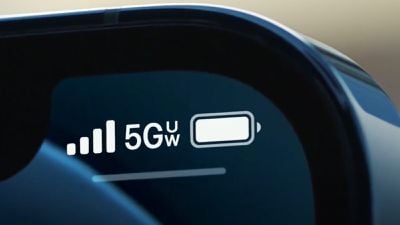
mmWave 5G networks are the fastest 5G networks, but mmWave is short-range and can be obscured by buildings, trees, and other obstacles, so its use is limited to major cities and urban areas along with venues like concerts, airports, and other places where a lot of people congregate.
Sub-6GHz 5G is more widespread and available in urban, suburban, and rural areas across the United States and other countries. For the most part, when you use a 5G network, you'll be using Sub-6GHz 5G. Sub-6GHz 5G is typically faster than LTE, especially when mid-band spectrum is used, but it isn't always the blazing fast 5G that you expect.
5G Bands
The iPhone 14 Pro models in the United States support more than 20 5G bands. The following bands are supported:
- Sub-6GHz 5G - Bands n1, n2, n3, n5, n7, n8, n12, n14, n20, n25, n26, n28, n29, n30, n38, n40, n41, n48, n53, n66, n70, n71, n77, n78 n79
- mmWave 5G - Bands n258, n260, n261
LTE Bands
The iPhone 14 models continue to offer Gigabit LTE with 4x4 MIMO for connecting to LTE networks when 5G is unavailable. The following bands are supported:
- FDD-LTE - Bands 1, 2, 3, 4, 5, 7, 8, 12, 13, 14, 17, 18, 19, 20, 25, 26, 28, 29, 30, 32, 66, 71
- TD-LTE - Bands 34, 38, 39, 40, 41, 42, 46, 48, 53
Emergency SOS via Satellite
iPhone 14 models can now connect to satellites in emergency situations when cellular and WiFi connections are not available. Apple has designed the new Emergency SOS via satellite feature to allow the iPhone's antennas to connect to satellites operated by Globalstar.
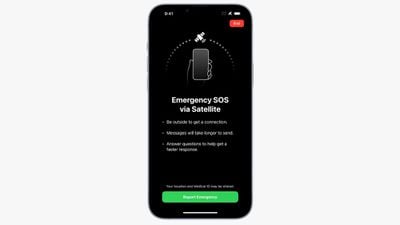
Satellite communications are available in emergency situations where you can't connect to WiFi or a cellular tower, and the feature is designed to be used in open spaces with few trees so the iPhone can connect to a satellite that's in the sky.
Apple has a walkthrough interface that instructs you how to hold the iPhone to connect to a satellite, and the company has developed a compressed messaging protocol because sending data via satellite can take minutes. In an area with no trees, a short message to emergency services can send in as little as 15 seconds.
Emergency SOS via satellite provides a series of important questions that you answer when it is activated, with these questions aimed at getting necessary details to emergency personnel as quickly as possible. The answers that you provide are sent directly to emergency services if text communication is supported in your area, or sent to relay centers staffed by Apple-trained specialists who can call emergency services on the user's behalf.
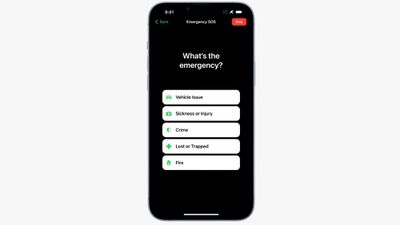
Satellite connectivity is mainly designed to allow users to contact emergency services in dire situations, but it can also be used to update your Find My location if you're camping or hiking off the grid, giving your family and friends peace of mind about where you are.
- iPhone 14: How to Demo or Use the Emergency SOS via Satellite Service
- How to Share Your Location via Satellite With Find My
Emergency SOS via satellite is free for all iPhone 14 users for two years, and Apple has not yet provided details on what the satellite functionality will cost in the future.
Crash Detection
There's a high dynamic range gyroscope and a dual-core accelerometer capable of detecting G-force measurements of up to 256Gs, and paired with other iPhone sensors like a barometer that can detect cabin pressure changes caused by deployed airbags, this new hardware enables a Crash Detection feature.
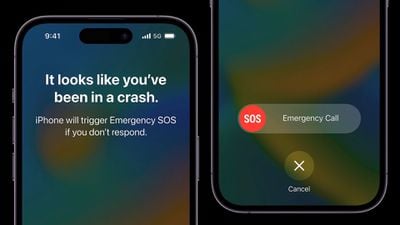
The iPhone 14 models can detect a severe car crash and automatically dial emergency services when the car's occupants are seriously injured or unable to reach their iPhone. Apple trained motion detection algorithms on more than a million hours of real-world driving and crash record data for accuracy purposes, and it has been proven to work in the real world. There are some issues with Crash Detection, as it has been mistaking roller coaster rides for car crashes in some instances.
The GPS in the iPhone is able to detect speed changes, and the microphone is able to recognize loud sounds associated with severe car crashes. Crash Detection is also available on the Apple Watch, and the iPhone and Apple Watch work together to contact emergency services when an accident occurs.
Bluetooth, WiFi, NFC, GPS, and U1
The iPhone 14 Pro and Pro Max support WiFi 6 (802.11ax) with 2x2 MIMO, and Bluetooth 5.3. There's an NFC chip with reader mode, and a U1 Ultra Wideband chip. The U1 provides improved spatial awareness, allowing iPhone 14 models to precisely locate other U1-equipped Apple devices.
The U1 chip can be used for precision tracking, such as when locating AirTags. It is also used for directional AirDrop and for interactions with the HomePod mini with a U1 chip. As for GPS, the iPhone 14 models support GPS, GLONASS, Galileo, QZSS, and BeiDou location services and both the L1 and L5 frequencies for improved positioning accuracy.
MagSafe
There continue to be MagSafe magnets at the back of the iPhone 14 Pro models, with those magnets able to connect to the MagSafe charger and other magnetic accessories. Official MagSafe chargers from Apple can wirelessly charge the iPhone 14 Pro models at up to 15W.
Qi-based charging is also available, but it maxes out at 7.5W.
iPhone 14 and iPhone 14 Plus
The iPhone 14 and 14 Plus are Apple's more affordable modern iPhones for those who want longevity and performance but without all the bells and whistles of the Pro models.
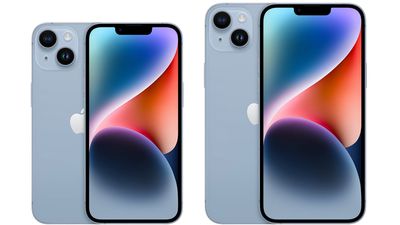
Compared to the iPhone 14 Pro and Pro Max, the 6.1-inch iPhone 14 and 6.7-inch iPhone 14 Plus have inferior camera technology, a prior-generation A15 chip, no ProMotion, no Always-On display, and no Dynamic Island.
They do, however, offer camera improvements, Crash Detection, and Emergency SOS via satellite.
Future iPhones
Apple is already working on the iPhone 15 models that will see a launch in 2023. We have details on what we've heard about the iPhone 15 and iPhone 15 Pro in our dedicated iPhone 15 roundup and our iPhone 15 Pro roundup.
iPhone 14 Pro Roundup Changelog
- August 8 - Updated should you buy section.
- August 3 - Added a new featured video.
- July 26 - Refined Buyer's Guide, added links to iPhone 15 roundups.
- May 24 - Added a Buyer's Guide section.

